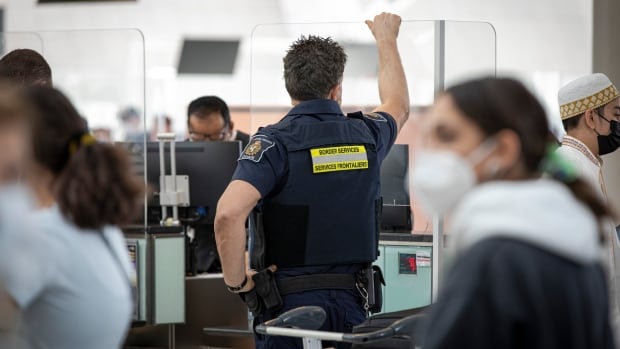The national spy watchdog says Canada Border Services Agency needs to do a better job of documenting how and why it identifies certain airline passengers for possible further investigation. .
The Canada Border Services Agency’s targeting program uses pre-arrival risk assessments to identify inbound air travelers who are likely to be ineligible to enter Canada.
As a first step, border authorities will examine information routinely provided by commercial airlines about passengers, including age, gender, national and ethnic origin.
The National Security Intelligence Review Agency found that border officials rely on intelligence and information from a variety of sources to determine which data elements to treat as indicators of risk.
An intelligence watchdog report released late Thursday said border authorities have the legal authority to carry out such targeting of air passengers.
However, it details deficiencies in the documentation of the Border Agency’s program activities that made it difficult to ensure that all decisions complied with legal and regulatory limits.
“These weaknesses also impede the CBSA’s own ability to provide effective internal oversight,” the report states.
In 2019-20, the Border Agency used information from airlines to conduct risk assessments for 33.9 million arriving international travelers.
“A short-term interruption to passenger freedom and freedom of movement is reasonable, given the state’s legitimate interest in testing travelers and regulating entry,” the report said.
CBSA agreed with NSIRA’s recommendations
However, it added that the border agency’s activities “must not be discriminatory” given its obligations under the Canadian Human Rights Act and the Charter of Rights and Freedoms.
The report said border agencies’ reliance on indicators developed from passenger data was not adequately justified in some instances, leading to a “risk of discrimination”.
The report states that ensuring that targeting practices are “substantiated by relevant, reliable and documented information and intelligence will demonstrate that travelers’ equal rights are respected. It is important for
The Information Review Authority recommends a number of measures to improve record-keeping and identify and reduce potential for discrimination. In an accompanying response, the Border Agency agrees with various recommendations.
The review covered the period from November 2020 to September 2021 and focused on the Border Agency’s triage activities for air passengers related to potential national security-related threats. However, it also examined factors related to illegal immigration and contraband smuggling.
Border authorities have two ways to use passenger data to prioritize passengers: flight list targeting and scenario-based targeting.
Flight list targeting is a manual triage method that first selects arriving flights that are considered “high risk” carrying passengers who may violate the law. The targeted officer then selects the passengers on that flight and further vets them based on their details.
Scenario-based targeting is an automated triage method that relies on a pre-established set of indicators created from passenger data and in which border authorities consider risk factors for specific enforcement issues.
According to the report, passenger data from all arriving flights will be automatically compared with the parameters of each scenario. Passengers whose data matches all parameters of one or more scenarios are automatically selected for further evaluation.
NSIRA may not be able to verify compliance
Regarding the Border Agency’s automated scenario-based targeting method, the review body found that the use of passenger data to identify potential threats and violations of the law complies with legal regulations.
Regarding the method of manual flight list targeting by border authorities, the review body was unable to assess the reasons for individual travellers’ selections and therefore could not verify compliance with customs laws.
For both methods, the review body must ensure that all triage complies with regulations regarding the use of passenger data by border agencies, i.e. to identify potential involvement in terrorist crimes or serious cross-border crimes. It was not possible to verify whether it was used for
This was due to inaccurate documentation of the scenario-based targeting program and a lack of information on the basis of triage decisions for flight list targeting, the report said.

